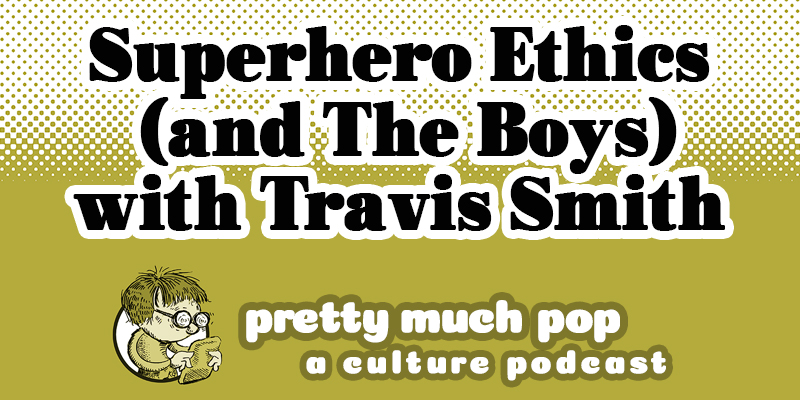What Can Superhero Media Teach Us About Ethics: A Pretty Much Pop Culture Podcast (#63) Discussion with Philosophy Professor Travis Smith

Is there no end to the seemingly endless fascination with superhero media? Your hosts Mark Linsenmayer, Erica Spyres, and Brian Hirt are joined by Travis Smith, who teaches political philosophy at Concordia University, to discuss. Travis sees their resonance as a matter of metaphor: How can we do more with the abilities we have? His book Superhero Ethics: 10 Comic Book Heroes, 10 Ways to Save the World, Which One Do We Need Now? matches up heroes like Batman vs. Spider-Man for ethical comparison: Both "act locally," but Batman would like to actually rule over Gotham, while Spider-Man engages in a more "friendly neighborhood" patrol. What philosophy should govern the way we try to do good in the world?
Lurking in the background is the current release of season two of the Amazon series The Boys, based on Garth Ennis' graphic novels, which assumes that power corrupts and asks what regular folks might do in the face of corporate-backed invulnerability. This cynical take is part of a long tradition of asking "what if super-heroes were literally real?" that goes through Watchmen all the way back to Spider-Man himself, who faces financial and other mundane problems that Superman was immune to.
Given Travis' book, we didn't really need supplementary articles for this episode, but you can take a look at this interview with him to learn more about his comic book loves and the Canadian heritage that led him to start fighting crime (you know, indirectly, through ethical teaching).
Learn more at prettymuchpop.com. This episode includes bonus discussion that you can only hear by supporting the podcast at patreon.com/prettymuchpop. This podcast is part of the Partially Examined Life podcast network.
Pretty Much Pop: A Culture Podcast is the first podcast curated by Open Culture. Browse all Pretty Much Pop posts
What Can Superhero Media Teach Us About Ethics: A Pretty Much Pop Culture Podcast (#63) Discussion with Philosophy Professor Travis Smith is a post from: Open Culture. Follow us on Facebook, Twitter, and Google Plus, or get our Daily Email. And don't miss our big collections of Free Online Courses, Free Online Movies, Free eBooks, Free Audio Books, Free Foreign Language Lessons, and MOOCs.
from Open Culture https://ift.tt/3nAedns
via Ilumina
Comments
Post a Comment